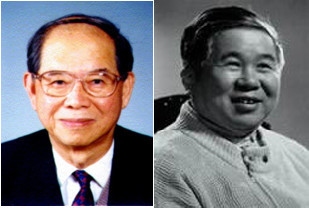bladerunner
Banned Idiot

Xie Jialin (L) and Wu Liangyong
Two names were added to the list of the country's top science and technology award winners on Tuesday. They were 92-year-old physicist Xie Jialin and 90-year-old Wu Liangyong, an architect and expert in urban planning.
Like their 18 predecessors, their age testifies to the contributions they have made in their fields and their whole-hearted devotion to their professions.
Their painstaking and life-long efforts are well worth such acclaim.
The national science and technology award was initiated in 2000 to pay tribute to those who have made outstanding achievements in scientific research and technological innovation. It was meant to encourage more scientists to devote themselves to the advancement of the country's technological capability.
However, in striking contrast to the great honor Xie and Wu have received, an ex-candidate for the academician of Chinese Academy of Sciences was tried in Beijing on Tuesday for embezzling public funds intended for scientific research.
Given the bureaucratization of our institutions of higher learning and the increasing tendency among scholars and researchers to seek fame and fortune, the example of these veteran scientists, who have dedicated themselves to their research without bothering about money and fame, can never be overemphasized.
Qian Xuesen (1911-2009), the father of China's aerospace achievements, lamented in his late years the inability of this country's institutions of higher learning to produce great scientists.
Great minds always see beyond immediate personal gain. But nowadays, many of our professors and researchers get entangled in the pursuit of higher academic titles or seek extra money by acting as business advisors.
Some even resort to plagiarizing research papers or become obsessed with connections in order to get immediate success. In their mind's eye, research is nothing but the means for fame and material rewards.
Should young scientists learn anything from the top award winners like Xie and Wu, it is their never-say-die spirit and their disregard for fame and money, which has enabled these great minds to pursue their research regardless of what they will receive in return for their efforts.
While we hold these top science award winners in reverence, we need to bear in mind that those who always view research through the prism of expediency will never produce anything that will be of benefit to the country.
Im not disputing the merits on awarding this scientist this award but to have to go so far back to find someone worthy enough of the award in China is rather telling.
.".........In 2011, the Lasker-DeBakey Clinical Medical Research Award, one of the top honors for life sciences with many awardees going on to win the Nobel Prize, went to the Chinese medical scientist Tu Youyou for the discovery of a new malaria drug that has saved millions of lives in the developing world. The work, however, was achieved during the "cultural revolution" (1966-76) when money was scarce and scientists were under attack."

